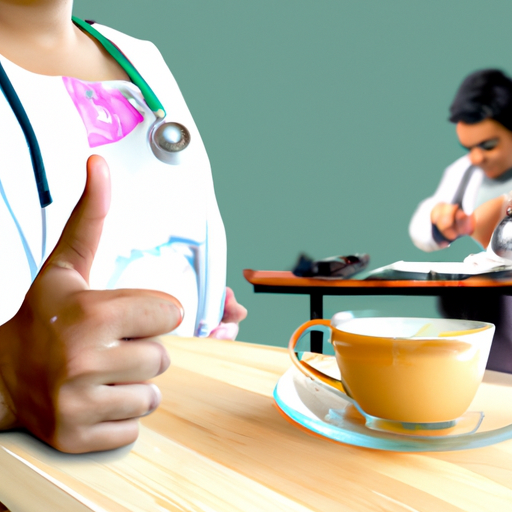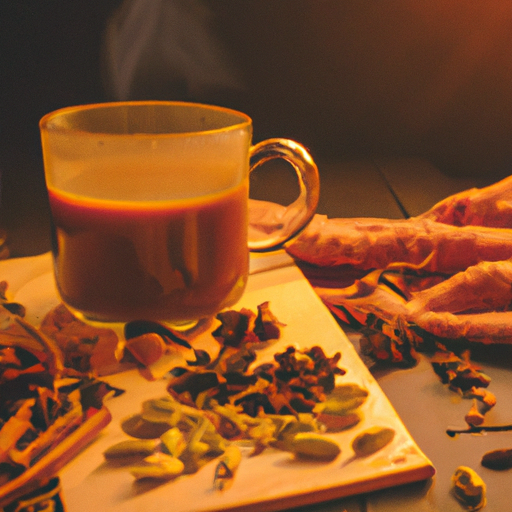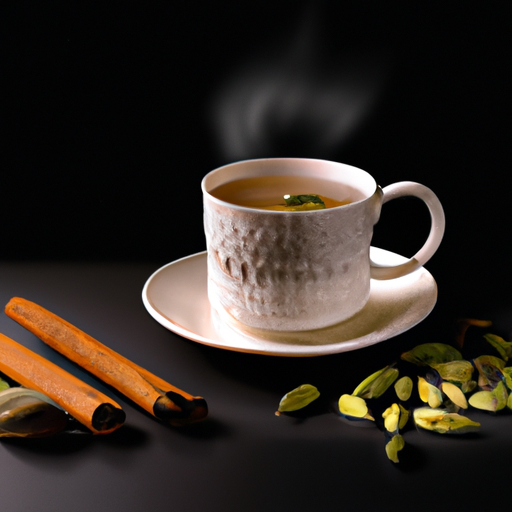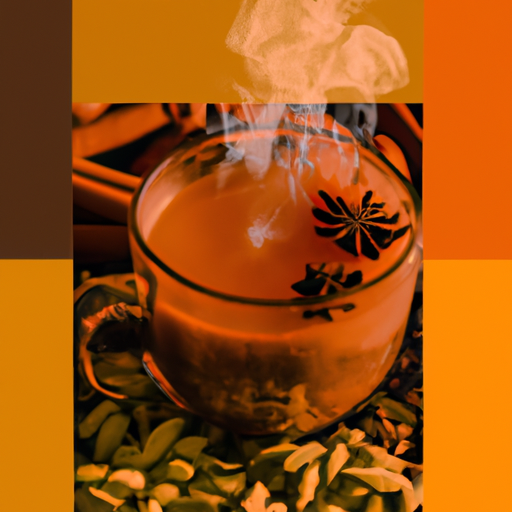When you’re pregnant, it’s crucial to focus on both your own health and the well-being of your developing baby. This means paying attention to your diet and hydration while pregnant.
One common question that arises for chai tea lovers is whether or not it’s safe to consume chai tea while pregnant. Chai tea is a beloved beverage that combines black tea, spices such as cinnamon and cardamom, milk, and sweetener.
While many people find comfort in sipping on this warm and flavorful drink, the safety of consuming chai tea during pregnancy is still up for debate. In this article, we’ll explore the potential risks and benefits of drinking chai tea during pregnancy so you can make an informed decision about whether or not to incorporate it into your diet.
Key Takeaways
- Chai tea can be a risky option during pregnancy due to its caffeine content and other ingredients, but limited consumption can offer several benefits such as relieving nausea and boosting immunity.
- Pregnant women should limit daily caffeine intake to no more than 200mg per day and should consider decaf options if concerned about caffeine intake.
- Herbal tea options like rooibos or peppermint chai are naturally caffeine-free and generally considered safe during pregnancy, but it’s best to consult with healthcare professionals before trying any new brand or flavor.
- Consulting with a healthcare provider is crucial during pregnancy to ensure a healthy diet and exercise routine, and it’s important to understand specific concerns related to pregnancy and take steps towards ensuring a healthy and happy pregnancy.
Understanding the Importance of a Healthy Pregnancy Diet
You gotta nourish that growing baby bump with a healthy diet, so understanding what foods to eat during pregnancy is key! A balanced and varied diet can provide the nutrients needed for both you and your developing baby. In addition, certain nutrition supplements may be recommended by your healthcare provider.
Maintaining an exercise routine during pregnancy can also help support a healthy pregnancy. Regular physical activity can boost mood, improve sleep quality, and reduce the risk of gestational diabetes and hypertension. However, it’s important to consult with your healthcare provider before beginning or continuing any exercise regimen.
Now that we understand the importance of a healthy pregnancy diet, let’s dive into whether or not chai tea is safe to consume during this time.
What is Chai Tea?
Chai tea is a blend of black tea, spices, and milk that originated in India. The ingredients used to make chai tea vary depending on the recipe and the region in which it is made. Some common ingredients include cinnamon, cardamom, ginger, cloves, and black pepper.
Chai tea can be enjoyed hot or cold and has gained popularity around the world due to its unique taste. The history of chai tea dates back thousands of years to ancient India where it was used for medicinal purposes. It was believed that the spices found in chai could help aid in digestion and boost immunity.
Over time, chai became a staple beverage in Indian households and eventually spread to other parts of the world through trade routes. While chai tea may have numerous health benefits when consumed in moderation by healthy individuals, pregnant women should exercise caution when drinking this popular beverage due to potential risks. These risks will be discussed further in the subsequent section about potential risks of consuming chai tea during pregnancy.
Potential Risks of Consuming Chai Tea During Pregnancy
If you’re expecting a child, it’s important to note that consuming excessive amounts of caffeine can increase the risk of miscarriage. According to a study by the American Journal of Obstetrics and Gynecology, pregnant women who consume more than 200mg of caffeine per day have an increased risk of miscarriage. Chai tea contains black tea as one of its main ingredients, which is a source of caffeine. Therefore, consuming too much chai tea during pregnancy may pose potential risks.
To minimize these risks, it’s important for expectant mothers to take precautions when drinking chai tea. Here are three things to keep in mind:
-
Limit your intake: It’s recommended that pregnant women limit their daily caffeine intake to no more than 200mg per day. This equates to about one or two cups of chai tea per day, depending on the brewing method and strength.
-
Check the ingredients: Some types of chai tea may contain additional herbs and spices that can be harmful during pregnancy, such as cinnamon or ginger in large amounts. Be sure to check the label or consult with your healthcare provider before trying a new brand or flavor.
-
Consider decaf options: If you’re concerned about your caffeine intake but still want to enjoy chai tea during pregnancy, consider opting for decaffeinated varieties instead.
While there are potential risks associated with consuming chai tea during pregnancy due to its caffeine content and other ingredients, taking proper precautions can help mitigate these risks. In the next section, we’ll discuss safe limits for drinking chai tea during pregnancy without compromising your health or that of your unborn child.
Safe Limits for Drinking Chai Tea During Pregnancy
Pregnancy doesn’t mean giving up your favorite warm beverage – it’s important to know the safe limits of caffeine intake from chai tea. While there is no clear consensus on what constitutes a safe limit for caffeine consumption during pregnancy, most health experts recommend limiting intake to 200 milligrams or less per day.
A standard cup of chai tea typically contains about 50 milligrams of caffeine, so drinking one or two cups a day should be within safe limits. It’s also worth noting that many chai teas are made with black tea, which has higher levels of caffeine than other types of tea. If you’re concerned about your caffeine intake, you may want to opt for herbal tea options such as rooibos or peppermint chai instead. These varieties are naturally caffeine-free and can still offer the same delicious flavor and aroma as traditional chai blends.
While it’s possible to enjoy a cup or two of chai tea during pregnancy, it’s important to be mindful of your overall caffeine intake and choose herbal alternatives whenever possible. In the next section, we’ll explore some potential benefits of drinking chai tea during pregnancy that may make it an even more appealing choice for expectant mothers.
Benefits of Drinking Chai Tea During Pregnancy
As a pregnant woman, I’ve found that drinking chai tea has helped me relieve nausea and digestive issues. Chai tea contains ginger and other spices that are beneficial for digestion and can soothe an upset stomach.
Additionally, the immune-boosting properties of chai tea can provide added protection during pregnancy. Our bodies are more vulnerable to illness during this time, so it’s important to take precautions.
Overall, drinking chai tea can offer several benefits for pregnant women. It’s a tasty and natural way to help alleviate some of the discomforts that come with pregnancy.
Relieving Nausea and Digestive Issues
Relax and indulge in a warm cup of chai tea to ease any nausea or digestive discomfort during pregnancy. While natural remedies and lifestyle changes can improve overall health, sometimes these methods are not enough to alleviate pregnancy-related symptoms. Instead of turning to herbal supplements or medication alternatives, opting for a warm cup of chai tea can provide relief.
Chai tea is made from a blend of herbs and spices, such as ginger, cinnamon, cardamom, and clove. These ingredients have been shown to aid digestion by reducing inflammation in the gut and increasing the production of digestive enzymes. In fact, studies have found that consuming ginger can significantly reduce nausea during pregnancy. Additionally, the warming properties of chai tea can help relax muscles in the abdomen and promote bowel movements, further easing digestive issues. So next time you’re experiencing discomfort during your pregnancy journey, consider sipping on a comforting cup of chai tea.
Transitioning to the next topic, it’s important to note that boosting immunity is also crucial during pregnancy.
Boosting Immunity
Get your immune system in tip-top shape by incorporating nutrient-rich foods and regular exercise into your daily routine. A strong immune system is crucial during pregnancy to protect both you and your growing baby from harmful viruses and infections.
Eating a healthy diet that includes plenty of fruits, vegetables, whole grains, lean proteins, and healthy fats can provide the necessary vitamins and minerals needed to support a robust immune response. In addition to a healthy diet, there are also natural remedies that can help boost immunity during pregnancy.
Some examples include probiotics, which can improve gut health and strengthen the immune system; garlic, which has antimicrobial properties; and ginger, which has anti-inflammatory effects. Regular exercise is also important for maintaining a strong immune system as it helps increase circulation, reduce stress levels, and promote overall health.
By incorporating these lifestyle changes into your routine, you can give yourself the best chance at avoiding illness during pregnancy. When it comes to beverages during pregnancy, it’s important to be cautious about what you consume.
While chai tea may have some potential health benefits due to its antioxidant content, it also contains caffeine which should be limited during pregnancy. There are many alternatives to chai tea that are safe for pregnant women including herbal teas like peppermint or ginger tea or simply enjoying water infused with lemon or cucumber for added flavor without any potential negative side effects.
Alternatives to Chai Tea During Pregnancy
You might want to try herbal tea options like peppermint or ginger instead of chai tea when you’re pregnant. These teas are generally considered safe and can even help with nausea, a common symptom during pregnancy.
Peppermint is known for its ability to soothe stomachs and reduce bloating, while ginger has been shown to alleviate morning sickness. It’s important to note that not all herbal teas are safe during pregnancy, so it’s best to stick with those that have been deemed caffeine-free and safe by healthcare professionals.
Some other types of herbal teas that may be beneficial during pregnancy include chamomile, raspberry leaf tea, and lemon balm tea. Be sure to check with your doctor before trying any new type of beverage. Consulting with your doctor is the best way to ensure a healthy pregnancy.
They can provide specific recommendations based on your individual health needs and guide you in making informed decisions about what foods and drinks are safe for you during this time. Remember, taking care of yourself is crucial for both you and your growing baby’s wellbeing.
Consult with Your Doctor
When it comes to pregnancy, there are a lot of concerns you may have, especially when it comes to what you can and cannot consume. It’s important to understand your specific pregnancy concerns and how they relate to your diet.
This is why consulting with your doctor is crucial in getting professional advice on the matter. They can help guide you towards safe choices for both you and your growing baby.
Understanding Your Specific Pregnancy Concerns
As an expecting mother, it’s essential to understand the unique concerns that come with pregnancy, such as what foods and drinks are safe to consume. This includes understanding how certain food and drinks may affect both you and your growing baby.
For instance, if you’re feeling anxious during your pregnancy, it’s important to know which teas or other beverages can help alleviate those feelings without causing harm.
Another concern that many pregnant women have is regarding exercise routines. It’s important to stay active during pregnancy for a healthy pregnancy and delivery, but it’s equally important to make sure your exercise routine is safe for both you and your baby.
This means avoiding high-impact or contact sports that could potentially harm your developing baby. Instead, opt for low-intensity activities like prenatal yoga or walking.
By understanding these specific concerns related to pregnancy, you can take steps towards ensuring a healthy and happy pregnancy. However, when in doubt about any aspect of your health during this time, seeking professional advice should always be the first course of action.
Getting Professional Advice
If you’re feeling uncertain about any aspect of your health during pregnancy, it’s important to seek professional guidance from a trusted healthcare provider who can provide you with the best course of action for you and your baby.
This includes seeking advice on whether or not it’s safe to consume certain foods and beverages such as chai tea. While chai tea can be a delicious and comforting beverage, it may contain ingredients that aren’t recommended for pregnant women.
Your healthcare provider can help you make dietary modifications that will ensure that both you and your baby remain healthy throughout your pregnancy. With their guidance, you can make informed choices about what to eat and drink, including whether or not to enjoy a tasty homemade cup of chai tea.
Making Chai Tea at Home
To prepare homemade chai tea, simply combine black tea, spices, milk, and sweetener in a pot and let simmer for a few minutes. Chai tea recipes vary depending on the region of origin. However, some common ingredients include cinnamon sticks, cardamom pods, ginger root, cloves, and black peppercorns. These aromatic spices provide not only a distinct flavor but are also known to have health benefits such as reducing inflammation and aiding digestion.
Brewing techniques can also differ depending on personal preference. Some may choose to steep the black tea first before adding the spices while others prefer to add everything at once. It’s recommended to use whole spices rather than powdered for better flavor infusion. Additionally, using fresh ginger root instead of dried provides an extra zingy taste that can be very refreshing.
While enjoying chai tea during pregnancy is still up for debate due to its caffeine content and possible effects on fetal development, there’s no harm in indulging post-pregnancy as long as it’s consumed in moderation. Drinking chai tea after giving birth can have potential benefits such as boosting energy levels and easing stress. As always, though, it’s important to consult with your doctor or healthcare provider before making any dietary changes postpartum.
Drinking Chai Tea Post-Pregnancy
I hope the previous subtopic was helpful in teaching you how to make chai tea at home. As a new mother, I understand how crucial it is to take care of oneself during postpartum recovery.
It can be challenging to find time for self-care while caring for a newborn, but drinking chai tea can be an excellent addition to your routine. Chai tea contains black tea, which has caffeine content. As such, consuming it during pregnancy may not be recommended without consulting with your healthcare provider first.
However, after giving birth and during postpartum recovery, drinking moderate amounts of chai tea may not pose any significant health risks. Breastfeeding considerations are vital when deciding what to consume during this period. While there isn’t much research on the effects of consuming chai tea while breastfeeding, it’s best to err on the side of caution and drink it in moderation.
Moreover, some studies suggest that certain ingredients like ginger in chai tea may even help improve breastmilk production. As a new mom myself who loves her cup of chai tea every day, I believe that enjoying moderate amounts of this delicious beverage can be part of a healthy postpartum diet.
Nonetheless, always consult with your healthcare provider before adding anything new to your diet while pregnant or breastfeeding. Cheers to a healthy and happy postpartum journey!
Frequently Asked Questions
Can consuming chai tea during pregnancy have any long-term effects on the baby?
Consuming chai tea during pregnancy can have several nutritional benefits for both the mother and baby. Chai tea is rich in antioxidants, which can help reduce inflammation and prevent cell damage. It also contains ginger, which can alleviate nausea and vomiting during pregnancy. Additionally, cinnamon in chai tea may help regulate blood sugar levels, reducing the risk of gestational diabetes.
When it comes to recipe ideas for prenatal chai, one option is to make a homemade version using black tea, spices like cinnamon and cloves, ginger root, milk or non-dairy alternatives like almond milk or coconut milk, and sweetener such as honey or maple syrup. However, it’s recommended to limit caffeine intake during pregnancy so it’s best to consume prenatal chai in moderation.
As with any food or beverage consumed during pregnancy, it’s important to consult with a healthcare provider before adding prenatal chai into your diet.
Is it safe to consume chai tea during all trimesters of pregnancy?
It’s important to consider the nutritional benefits of consuming chai tea during pregnancy. While it can be a comforting and delicious drink, it’s recommended that pregnant women consume no more than 200mg of caffeine per day.
Chai tea typically contains black tea, which has caffeine, so it’s important to keep track of your overall caffeine intake from all sources. Additionally, some chai teas may contain other ingredients such as spices or herbs that could potentially affect pregnancy outcomes.
It’s always best to consult with your healthcare provider before adding any new foods or drinks to your diet during pregnancy. Remember the old saying, ‘An ounce of prevention is worth a pound of cure.’
Can chai tea be beneficial for pregnant women with morning sickness?
When dealing with morning sickness during pregnancy, natural remedies can be a great alternative to medication. However, chai tea may not be the best choice for pregnant women due to its caffeine content and potential adverse effects on fetal development.
There are plenty of other chai tea alternatives that can provide similar benefits without the risks. Ginger tea is one such option that’s been shown to alleviate nausea and vomiting in pregnant women. Peppermint tea is another great choice as it can soothe an upset stomach and aid in digestion.
Overall, when looking for natural remedies for morning sickness during pregnancy, it’s important to choose options that are safe and effective for both mother and baby.
Are there any specific ingredients in chai tea that pregnant women should avoid?
During pregnancy, it’s important to be cautious about what we consume. While chai tea can provide many benefits during pregnancy, there are specific ingredients that should be avoided.
For instance, some blends may contain caffeine or herbs that can have adverse effects on fetal development. However, if you choose a blend that is made with safe ingredients such as ginger or cinnamon, consuming chai tea in moderation can offer several health benefits for pregnant women.
Ginger and cinnamon are both known for their anti-inflammatory properties which can help alleviate morning sickness and nausea during pregnancy. It’s best to consume chai tea in the morning or early afternoon since the caffeine content in some blends may interfere with your sleep at night.
Overall, consulting with a healthcare provider before adding chai tea to your diet during pregnancy is recommended to ensure it’s safe for you and your baby.
Does the caffeine content in chai tea affect the baby’s development during pregnancy?
It’s important to consider the impact of caffeine on fetal growth during pregnancy. While chai tea can be a comforting and enjoyable beverage, it does contain caffeine. Studies have linked caffeine to low birth weight and other negative outcomes. Therefore, it may be wise for pregnant women to limit their intake of caffeinated beverages, including chai tea.
However, there are many potential alternatives that can still provide warmth and flavor without the added caffeine. Decaffeinated versions of chai tea or herbal teas such as ginger or peppermint may be good options for those looking for a non-caffeinated beverage during pregnancy.
It’s always best to consult with a healthcare provider before making any changes to your diet during pregnancy.
Conclusion
In conclusion, as a soon-to-be mother, I understand the importance of making informed choices about what I consume during this delicate period.
While chai tea is generally safe to drink during pregnancy in moderation, it’s crucial to be mindful of potential risks and stick to safe limits.
As with any food or beverage, consulting with my doctor before consuming chai tea will ensure that I’m taking all necessary precautions for the health of myself and my baby.
Symbolically speaking, pregnancy can be seen as a journey where each step matters.
Just like how we plan our routes when traveling through unfamiliar territories, we must also plan our diet and lifestyle choices during pregnancy.
Drinking chai tea can be a comforting ritual for many, but drinking it responsibly while pregnant will only add value to this experience.
Remembering to prioritize my overall health and well-being while enjoying my favorite cup of chai tea will make this journey even more fulfilling.










